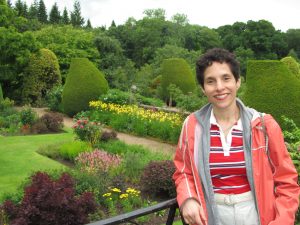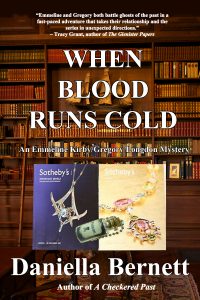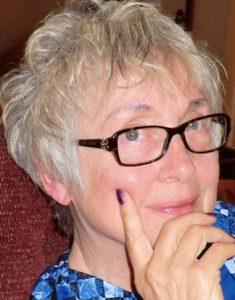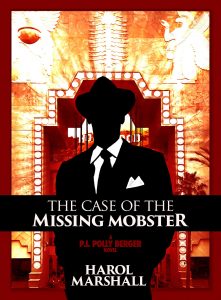Interviewing mystery author Daniella Bernett…
Wednesday, October 30th, 2019Steve: It’s my pleasure today to interview author Daniella Bernett, author of the Emmeline Kirby/Gregory Longdon mystery series. (A review of the first book, Lead Me Into Danger, follows.) Her sleuths are unusual. Emmeline is an investigative journalist while Gregory is a jewel thief. They’re both British, and together with a Scotland Yard detective, readers will find an unusual trio that makes her books fit nicely into one of my favorite subgenres, British mysteries. So please welcome Daniella to my blog. Why don’t you say something about yourself for the readers to get things started?

Daniella: I’m a member of the Mystery Writers of America, New York Chapter, and I have a B.S. in Journalism. The books in the series are set in the U.K. and Europe. Lead Me Into Danger, Deadly Legacy, From Beyond The Grave, and A Checkered Past are the first four books in the series. When Blood Runs Cold, Book 5, was released on September 21. Old Sins Never Die, Book 6, will be released in fall 2020. I’m currently working on Book 7 in the series. I’m also the author of two poetry collections, Timeless Allure and Silken Reflections.
Daniella on Reading and Writing:
Steve: Why, how, and when did you start writing?

Daniella: The spark that launched me into the writing world was my fourth grade teacher. Once a week, she had Creative Writing hour and gave us different assignments. I absolutely loved it. I started pursuing my dream by writing short stories (mostly mysteries). After I graduated from college, in the four months it took me to find employment, I wrote a mystery novel. My first job was as a copywriter at Penguin USA. One day, I plucked up the courage to show my book to one of the editors. She actually read it. She told me that it was better than what she usually sees from first-time authors. However, she said that I should think more in terms of a series. I tried revising the book and submitted it to several agents, who all rejected it. Thus, I chalked it up to a good exercise. But I didn’t forget the editor’s advice. The kernel of the idea for my Emmeline and Gregory mystery series slowly started swirling around in the back of my mind, until one day when all pieces fell into place, and Lead Me Into Danger, Book 1, came to life on the printed page.
Steve: What is your biggest problem with the writing process? How do you tackle it?
Daniella: Since I have a full-time job, squeezing in the time to write is my greatest challenge. I can only write when I come home in the evenings and on the weekends. I try to be disciplined about it.
Steve: Do you feel writing is something you need to do or want to do?
Daniella: Writing is like breathing. I simply must do it. I’ve had a love affair with language and the written word since I was very young. The idea that I could allow my imagination to roam freely and string words together like a strand of pearls to tell my own tale was (and still is) absolutely enchanting.
It can be frustrating at times when the words refuse to come and doubts bring my story spluttering to a halt. However, those instances are to be expected. Nothing can take away the sheer joy and sense of accomplishment in the creative process.
Steve: How much of your creative ability do you think is innate and how much is learned?
Daniella: I think most of my creativity is instinctive. Writing has always come naturally to me. I think what I learned in school merely honed the skills that I already possessed.
Steve: What is the last book you read? What are you reading now?
Daniella: The last book I read was The Sentence is Death by Anthony Horowitz. I’m currently reading Ribbons of Scarlet: A Novel of the French Revolution’s Women by Kate Quinn, Stephanie Dray, Laura Kamoie, E. Knight, Sophie Perinot and Heather Webb.
Steve: Who are your favorite authors? Whose writing inspires you the most and why?
Daniella: Among my favorite authors are Rhys Bowen, Lauren Willig, Alyssa Maxwell, Tracy Grant, Emma Jameson, Kate Quinn, Tasha Alexander, Susan Elia MacNeal, Tessa Arlen, Jeffrey Archer, Daniel Silva, and many, many others.
In terms of inspiration, Agatha Christie influenced me the most. There are so many things I admire about the grande dame of mystery. She was truly a master at her craft. What I love the most is that Christie conceived such deliciously wicked and ingenious plots that appeal to the reader’s intellect. Jealousy, love, and greed are the primary motives for murder. Christie took these motives and threw them into a pot, swirled them about, and in each book conjured up a new way to explore these emotions. Her stories endure to this day because of her astute insight into human nature and all its foibles.
I would like readers to be talking about my books long after I’m dead. I try to leave readers wanting more, like Christie did with such consummate skill. I hope I’m succeeding.
Steve: Should writers read in their genre? Should they be avid readers?
Daniella: I think writers are readers at heart. Reading nourishes my soul. It also has allowed me to develop a broad vocabulary and made my mind curious about many things. Books make the reader think.
I would tell aspiring writers to read everything they can get their hands on to get a feel for pacing, moods evoked, subjects written about and the language. Read different authors to see how each handles the narrative and plot twists. In the end though, let these other books merely be a guide. The most important thing is to write the story that you want to write and not what others tell you or what the current market trends are. To write a great story, you have to breathe it, live with it, and nurture it in your dreams and waking hours.


